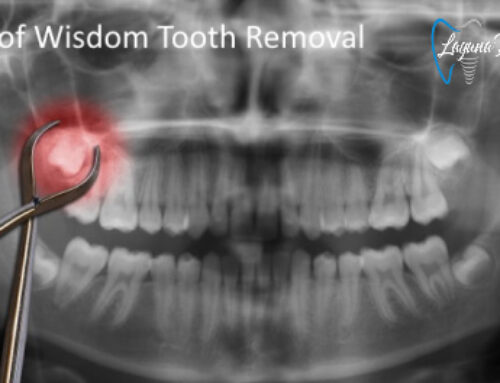Table of Contents

After having a wisdom tooth removed, recuperation usually takes 3–4 days. Within a few weeks, the extraction site has completely healed. The greatest methods for reducing pain in the afflicted region include cold compresses and oral painkillers. For the first few days following the extraction, limit your diet to soft foods like pudding, soup, and yogurt to prevent putting pressure on the extraction site. This will simply result in further bleeding and a slower healing time.
How Long is Recovery After Wisdom Tooth Removal?
Up to two weeks are needed for the procedure to properly recover. Swollen lips and cheeks are possible; these symptoms will subside over the following several days. Dentists frequently urge their patients to refrain from any severe physical activity for two to three days. Although recovery durations vary from person to person, many may return to work after two to three days off.
Wisdom Tooth Removal Recovery Timeline
- Days 1 – 2
A general anesthetic or IV anaesthetic may be used during the outpatient operation to remove wisdom teeth. After the procedure, make sure you have a family member, friend, or designated driver transport you home. Once the anesthetic wears off, it’s normal to feel mild to severe nausea as well as aching in the jaw and mouth. Request painkillers from your dentist for at least a week.
You’ll notice some light bleeding at the sites of the extractions, and some individuals get mild bruises around the lips and neck. The body’s normal response to surgery is inflammation around the lips and cheeks. On the day after surgery, you might anticipate some little edema.
After surgery, it is advisable to spend at least two days at home. Avoid strenuous exercise and give your body time to recover. A surgical site should not be irritated. Use a drinking straw, spit, or aggressively rinse.
- Days 3 – 4
This is when swelling will be at its highest. If you have throbbing pain, use painkillers. If it’s challenging to fully open your mouth, don’t panic. This will pass quickly. Make sure the extraction site or sites are constantly tidy. Rinse carefully with warm salt water or mouthwash.
When cleaning your teeth, be careful not to touch the surgery areas. Your mouth will begin to create collagen at this time, which is a precursor to fresh gum tissue. Avoid lifting, bending, and hard activity.
- Days 5 – 7
The majority of the edema, discolouration, and discomfort need to have diminished. Be sure to complete the whole 7-day course of antibiotics if they were prescribed to you to avoid infection. You need to be prepared to resume regular activity and exercise at this point.
You could see a little portion coming out when you rinse since the sutures will eventually disintegrate. Call your oral surgeon right away if you get a fever or see any evidence of pus, prolonged bleeding, or leakage.
Recovery times will vary from person to person. But if you take the safety precautions listed above, you should recover from wisdom teeth removal more quickly. Dr. Ronald Ayzin will discuss with you what to expect during your recovery time after wisdom tooth removal surgery and tips for recovery.
Recovery Tips After Wisdom Teeth Removal
Bleeding, pain, discomfort, and edema are all expected and are all considered normal. Avoid using a straw to drink, spitting, and smoking for at least 48 hours. This is essential to your healing.
How to Manage Pain After Wisdom Tooth Extraction?
For many hours, limit your activities as much as you can. Avoid speaking, drinking, and eating too much. Rinse no more for 24 hours.
Bite the gauze that has been supplied to keep pressure on the region if you are bleeding. Every 30 minutes, or as necessary, gently remove the gauze and change it out for a brand-new, folded pad. A tea bag works well in place of gauze if you run out. Once the bleeding has stopped or is only slightly visible, keep chewing the gauze. The pressure facilitates clot formation and significantly lowers the likelihood of face discoloration.
How to Reduce Swelling After Wisdom Teeth Removal?
For a total of an hour, place an ice pack to the cheek side of the surgery site for 15-20 minutes on and off. If you are extracting from both sides, switch sides. Do this for the following three to four hours. This significantly lowers the likelihood of edema and bruising.
How to Speed Up Healing After Wisdom Teeth Extraction?
You can give yourself a gentle rinse with warm salt water 24 hours after the bleeding has stopped. A teaspoon of salt should be dissolved in an 8 oz glass of warm water to create the saltwater. Rinsing is important because it clears the socket region of trash and food particles. It facilitates healing and aids in infection prevention.
Additionally, it’s crucial that you continue eating. It’s likely that you won’t be able to chew close to the incision. Consume wholesome foods and get enough of drinks. You can cautiously add more chewable meals as the discomfort subsides.
What Are the Foods You Can and Cannot Eat While Recovering from Wisdom Tooth Removal?
Drink a lot of water after having your wisdom teeth removed, and stick to soft meals like yogurt and applesauce. After surgery, stay away from alcohol, hot drinks, and carbonated beverages since they could irritate your tooth sockets.
When Can I Stop Worrying About Dry Socket During Wisdom Teeth Removal Recovery?
Drink a lot of water after having your wisdom teeth removed, and stick to soft meals like yogurt and applesauce. After surgery, stay away from alcohol, hot drinks, and carbonated beverages since they could irritate your tooth sockets.
Can I Go to Work the Next Day After Wisdom Tooth Extraction?
No. After having a wisdom teeth pulled, it is typically advised that you take a day or two off of work. A healing process that is compromised by excessive movement You will find it challenging to focus at work due to the post-operative discomfort.
Which Day is Worse During Impacted Wisdom Tooth Removal Recovery?
The second day following surgery is frequently the worst day for edema. Increased swelling makes it uncomfortable for some people to open their mouths.
Top dentist Dr. Ronald Ayzin will guide you with the do’s and don’ts after wisdom teeth removal and during the entire process, take care of you. For Laguna Dental Center Wisdom Tooth Removal, Call us to set up a consultation.
Our wisdom tooth removal expert can advise you for the right option for you.


